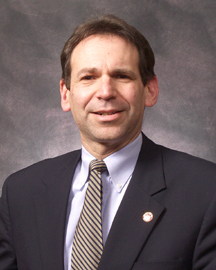 Steve Klein |
The first has to do with the declining number of male applicants to liberal arts colleges. The numbers vary, but the latest statistics suggest that women now out number men on liberal arts college campuses 57 to 43 percent. That's remarkable when you consider that the numbers were almost exactly the opposite as few as 20 years ago.
The declining number of applicants has led to media theme number two—the sky-rocketing discount rates and financial aid packages many colleges have been forced to employ in order to attract and retain good male students.
Wabash, which struggled mightily to fill its class in the early and mid-1990s, has experienced enormous success in the last few years, and has done so against the national odds.
That's why all of us at Wabash were excited to hear that President Andy Ford has promoted Steve Klein from director of admissions to dean of admissions. It's a fitting and richly deserved recognition of hard work and keen strategy.
Among the strategies Klein has put into place since arriving at Wabash in 1997 are a unique prospect management system; the utilization of Wabash alumni as front-line recruiters; and generating campus-wide enthusiasm and commitment to the recruitment of talented young men.
"The last two record-setting years resulted from the work of the entire Wabash community, but Steve Klein led those efforts," said President Ford. "He did so while virtually every other college in the country fretted over their inability to attract a sufficient number of applications from young men."
In each of the last three years, Klein's forces have improved the academic quality of the entering freshman class, while also improving the College's racial and geographic diversity. Wabash set a record when 1,133 freshmen applied for admission to enter in the fall of 2001.
This year Klein's office generated 1,310 applications for admission, exactly half of whom were accepted, making Wabash the second most selective college in the Great Lakes Colleges Association. Wabash expects approximately 275 men to enroll this fall.
"The admissions staff at Wabash is highly talented and motivated," says Klein. "I've never seen a team that works as hard as this group. They are dedicated to the College and to each other. And given the competition in today's higher education market, our success in recent years would not have been possible without this commitment level."
Indeed, Wabash's aggressive goals seemed impossible to achieve just a few years ago. The college had never before received 1,000 completed applications until 2001; this year Wabash surpassed 1,000 applications in the month of January on its way to a record total of 1,310.
And in an era that the media has dubbed the "Discount Wars"—during which colleges and universities have been cutting prices to attract the best students—Wabash's academic profile has grown while the financial aid fraction has been reduced.
Klein's high energy and attention to detail has produced excellent results. He quickly identified Wabash's key strengths and capitalized on them to market the college accurately and effectively.
Whereas it once was believed that a single sex college couldn't compete in today's market, Wabash has broken records and proved not only to be viable, but an exceptional choice for young men who want a rigorous liberal arts experience.
Indeed, I'm glad the country is finally noticing Wabash College. And I'm equally proud that the College recognized the excellence of Steve Klein's hard-working staff.